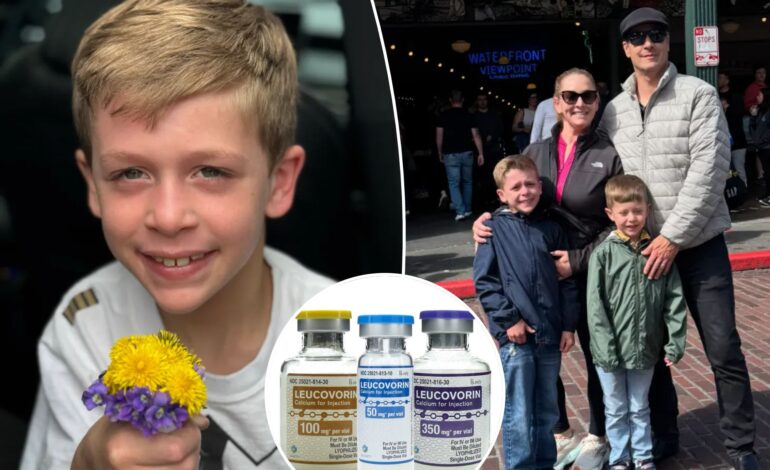Experimental Drug Helps Boy Regain Speech After Autism Diagnosis

Ryan Baldridge Jr., who lost his ability to speak at 18 months, has regained his voice through treatment with leucovorin, an inexpensive drug traditionally used to counteract the side effects of chemotherapy. This development has brought renewed hope to his family, who faced numerous challenges on their journey to find effective therapies for their son, diagnosed with autism at age four.
At first, Ryan Jr. was a bright toddler, effortlessly learning new words and phrases. However, everything changed at 18 months. “It was like he was erased and reset,” said his father, Ryan Baldridge Sr.. The toddler began exhibiting signs of echolalia, a speech disorder characterized by repeating phrases and fragments rather than speaking independently. His mother, Kimberly Baldridge, recalled, “All that vocabulary was gone. He wasn’t speaking for himself.”
Autism Diagnosis and Early Challenges
As Junior’s speech faded, he began showing other traits associated with autism, such as avoiding eye contact and having difficulty interacting with peers. The Baldridges raised their concerns with their pediatrician, but their worries were dismissed. “This was our first child, so we didn’t have anything to compare it to,” Ryan Sr. stated. “Yet there was something burning inside of us saying something is not right.”
After a formal diagnosis at age four, the family enrolled Junior in intensive applied behavior analysis therapy. Despite their efforts, they remained unsettled, leading them to explore additional treatment options online.
Discovering Leucovorin
Their research led them to Dr. Richard Frye, a pediatric neurologist investigating a potential link between autism and cerebral folate deficiency, which is caused by folate receptor alpha (FR⍺) autoantibodies blocking essential nutrients from reaching the brain. Research indicates that over 75% of children with autism carry these autoantibodies, compared to only 10 to 15% of children without the disorder.
In a clinical trial conducted by Frye in 2012, about one-third of children with autism who received leucovorin showed significant improvements in speech and language. The drug, costing approximately $100 per month without insurance, presented a promising option for the Baldridges, yet obtaining the necessary testing for Junior proved difficult.
Five doctors refused to sign the required forms, describing Frye’s research as a scam. “The kickback and the gaslighting was the most frustrating part,” Kimberly said. Eventually, a functional medicine doctor agreed to provide the needed authorization, and the results revealed that Junior had high levels of the FR⍺ antibody.
A Miraculous Turnaround
With the test results in hand, the Baldridges consulted with Frye, who prescribed leucovorin and suggested dietary changes. Within two weeks, Junior began speaking in full sentences again. One particularly emotional moment for Ryan Sr. came during a routine drop-off at therapy when Junior said, “Bye, dad, I love you,” without repeating anyone else’s words. “I got in the car and cried for about five minutes,” Ryan recalled.
Today, Junior continues to thrive. He now attends mainstream school with his younger brother, having skipped kindergarten. “He initiates play and he’s a social butterfly,” Ryan Sr. proudly shared.
Cautious Optimism and the Path Forward
Recently, former President Donald Trump referred to leucovorin as an “amazing” drug that could potentially address some aspects of autism. However, Dr. Frye cautions against viewing it as a miracle cure. “If you’re going to the doctor looking for an autism pill, it doesn’t exist,” he stated. “But leucovorin has helped a lot of children.”
Frye emphasizes the importance of combining leucovorin with other interventions, such as behavior and speech therapy. “You have to treat a lot of things to make the body well,” he explained.
The Autism Science Foundation has yet to endorse leucovorin as a definitive treatment, calling for larger, more rigorous studies to validate the current findings. The FDA, however, has moved forward with plans to approve a tablet version of leucovorin for patients with cerebral folate deficiency, underscoring the urgent need for potential treatments. Dr. Marty Makary, FDA Commissioner, stated, “Children are suffering and deserve access to potential treatments that have shown promise.”
In the two years since starting leucovorin, Junior has made significant progress, although he still exhibits some autism traits, such as occasional challenges with eye contact. His parents remain hopeful for his future. “It gives me hope and comfort thinking he’ll grow up to be a self-sufficient man who contributes to society,” Ryan Sr. said.
Kimberly encourages other parents to advocate for their children. “My advice to parents is to keep fighting, never settle and always question your doctor,” she urged. “You’ll be able to know if the medication might help based on that result. It’s step one.”






